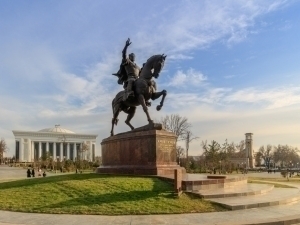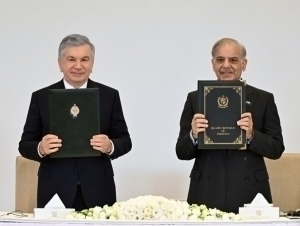Weekly Digest: Ministerial shake-ups, rampant bribery, and geopolitical tensions
Review
−
08 March 2025 33405 12 minutes
The past week in Uzbekistan has been marked by heated discussions on several pressing issues. Concerns have been raised about the increasing presence of the Chinese population and rumors surrounding the sale of land to Chinese investors. The resignation of the Minister of Internal Affairs has sparked speculation, as the reasons remain unclear. Alarming reports of schoolchildren becoming pregnant and cases of teachers sexually abusing underage girls have further fueled public outrage. Meanwhile, despite ongoing efforts to combat corruption, bribery appears to be on the rise, even within law enforcement agencies tasked with fighting it. These topics, which have dominated public discourse, will be explored in detail in the upcoming issue of the Weekly Digest.
Bobojonov dismissed
The matter of the dismissal of Lieutenant General Polat Bobojonov, who has been heading the Ministry of Internal Affairs of the Republic of Uzbekistan since 2017, came to light this week. Questions remain regarding the reasons behind his dismissal, as the presidential decree on his removal has not been published. On March 2, the press secretary of the President of Uzbekistan, Sherzod Asadov, announced on his Telegram page that Major General Aziz Tashpulatov—who had been serving as the head of the Tashkent City Main Department of Internal Affairs—had been appointed as the Minister of Internal Affairs of Tashkent.
Tashpulatov, who managed Tashkent’s security for three years, now serves as the minister. Sherzod Asadov did not specify what position Bobojonov would assume following his dismissal; however, it has been confirmed that Bobojonov is now even closer to the President, having been appointed Deputy Advisor to the President of the Republic of Uzbekistan on Personnel Policy. This information was provided by the Presidential Administration and the press secretary of the Ministry of Internal Affairs, Shohrukh Giyasov.
If you recall, the dismissal of the former Chairman of the State Security Service, Abdusalom Azizov, from his post three months ago was executed similarly to Bobojonov's case. Initially, on November 23, 2024, information leaked on social networks indicated that Lieutenant General Abdusalom Azizov, who had been serving as Chairman of the State Security Service since 2019, had been dismissed and replaced by Major General Bakhodir Kurbanov, who had been heading the Ministry of Defense since 2019. This information was soon confirmed on the Telegram page of the State Security Service, and a day later, Presidential Press Secretary Sherzod Asadov also confirmed the appointments. However, he did not specify the reasons for Azizov's dismissal, only stating that he had been transferred to the Secretariat of the Security Council under the President.
On December 4, Asadov published another message announcing that Abdusalom Azizov had been appointed Deputy Advisor to the President on Socio-Political, Religious-Educational, and Youth Issues for Youth Affairs.
Pulat Bobojonov's dismissal is not the only resignation in the Ministry of Internal Affairs. The First Deputy Minister and Head of the Rapid Investigation Department, Colonel Shavkat Rakhmonov, was also dismissed. The timing and reasons for his dismissal remain unclear, as the ministry has not officially responded to media reports, although Rakhmonov's name has already been removed from the management section of the organization's website. He had been serving in this role since February 2023.
The position vacated by Aziz Tashpulatov in the Main Department of Internal Affairs of Tashkent city was filled by Colonel Ravshan Sultankhodjaev, who has been working as the Head of the Khorezm Regional Department of Internal Affairs since August 2023. Sultankhodjayev is familiar with the workings of the capital's Main Department of Internal Affairs, having served as its Deputy Head - Head of the Crime Prevention Department from 2021 to 2023, and before that as Head of the Organizational Department of the Metropolitan Department of Internal Affairs, as well as Deputy Head of the Operational Investigation Department of the Ministry of Internal Affairs.
As for Bobojonov's resignation, it was long-awaited. According to public opinion and activists, during his tenure there was an increase in the number of prisoner suicides, the discovery of bodies in prisons, beatings of citizens by Internal Affairs officers, and instances of torture in pre-trial detention centers. There were even reports of Internal Affairs officers shooting themselves with their service weapons. Despite these serious issues, Bobojonov did not address the problems during his time as minister, nor did he apologize to the people for the torture, errors, and shortcomings within the system.
Changes in the Leadership of the Ministry of Emergency Situations
As you may recall, in late February, Major General Abdulla Kuldoshev, who had been serving as Minister of Emergency Situations since March 2022, was dismissed. His dismissal is no different from that of Bobojonov’s. The presidential press secretary and other officials did not announce the decree on Kuldoshev's dismissal, nor did they provide any information about his resignation or its reasons. Instead, Sherzod Asadov simply announced that the position had long been vacant, and by presidential decree, Botir Kudratkhodjaev—who had been working as Deputy Prosecutor General and Military Prosecutor—was appointed to head the Ministry of Emergency Situations.
In the past week, it was also announced that two deputy ministers, Khurshid Sotiev and Nuriddin Kadyrov, were dismissed by the President. The reasons for these resignations, which remain unclear, were later clarified by President Shavkat Mirziyoyev himself during an expanded meeting of the National Anti-Corruption Council dedicated to the effectiveness of work on preventing corruption and setting future priorities.
According to the head of state, Major General Abdulla Kuldoshev and his two deputies were dismissed due to increased bureaucracy and violations of the law on fire safety during the issuance of construction permits and the handing over of buildings.
These high-profile resignations have not been limited to the Ministry of Emergency Situations. Earlier this week, it was revealed that Khudoyor Meliev, the Deputy Minister of Justice of Uzbekistan who has been in his post since 2019, was dismissed in a secretive manner. Information about Meliyev was removed from the Ministry of Justice’s website, and his position now remains vacant. The Ministry of Justice has yet to clarify when this resignation took place or the reasons behind it.
In the meantime, viewers are advised to stay away from the screens, as the President held a serious meeting this week on combating bribery. The most interesting developments, it seems, are still to come.
Are Uzbek Lands Being Sold to the Chinese?
Across social media, a persistent rumor has captured public attention: the increasing number of shops, shopping malls, recreation centers, and restaurants owned by Chinese citizens in Uzbekistan—especially in the capital, Tashkent—is raising concerns that Uzbek lands, including those where strategic minerals are extracted, might be sold to the Chinese. Despite the fervor of these discussions, no clear public document has confirmed that any strategic minerals or Uzbek lands have been transferred to Chinese ownership.
The Cadastre Agency has addressed these rumors directly. The agency stated that the requirements for the transfer or realization of land plots are strictly established by the Land Code of the Republic of Uzbekistan. According to Article 17 of the Code, foreign citizens, legal entities, stateless persons, and enterprises with foreign investment may only own land plots on a lease basis. Further, Article 24 specifies that land plots are leased to enterprises with foreign investment, international associations and organizations, and foreign individuals and legal entities.
Additionally, under the Law “On the Privatization of Non-Agricultural Land Plots,” foreign citizens, stateless persons, foreign legal entities, and enterprises with foreign investment—as well as state bodies, institutions, enterprises, and local self-government bodies—are not eligible to privatize land. In other words, Uzbek lands will not be sold to foreigners, and even Uzbek citizens are barred from privatizing agricultural land.
The agency emphasized that reports claiming “our lands are being given to foreign citizens” are baseless and were published without thorough investigation. It urged citizens not to fall for deceptive rumors and asked social media activists to refrain from spreading false and unfounded news. The Cadastre Agency warned that unchecked misinformation can lead to public discontent, erode trust in the law, and negatively impact the investment climate.
Moreover, while there is noticeable growth in the number of Chinese businesses in Tashkent and across Uzbekistan—a reflection of the country’s potential as an emerging market—this is not a cause for alarm. Uzbekistan is a historically rich and underexplored market with high demand for Chinese goods, and China, facing tense relations with the United States and Europe, is keen on expanding into new markets. In fact, in December last year, a 30-day visa-free regime was introduced between Uzbekistan and China.
Global integration processes are intensifying, and markets are expanding. Consider that Uzbek communities in places like Brooklyn, Manhattan, and Cincinnati are thriving; thousands of Uzbeks with US passports reside in these cities, and numerous Uzbek restaurants, hotels, and supermarkets can be found in New York. A similar pattern is evident in Korea and Turkey. These countries are not concerned about the rising number of Uzbeks or their businesses—instead, they rely on strong laws and encourage innovation and competitive enterprise.
In conclusion, the core responsibility of any state is to establish robust laws, adhere to unchanging principles, and cultivate a strong, intelligent population. A nation can achieve a stable economy and political system by upholding the rule of law, creating a transparent legal society, promoting scientific advancement, reducing bureaucratic obstacles for entrepreneurship, and fostering broad opportunities for innovation. Developed countries that embrace integration and welcome diversity prove that a strong legal framework is the foundation of national progress.
75 Percent of Corruption Crimes Are Committed as Domestic Corruption
In Uzbekistan, many transactions that are not labeled as bribes—such as gifts, wedding favors, dowries, eye candy, and even funeral favors—are, in essence, equivalent to bribery. These practices can continue over extended periods with the common goal of pleasing someone. From maternity hospitals, kindergartens, and schools to universities and job placements, even advancing on the career ladder or quietly taking away accumulated assets after death, society has long taught its children to give bribes. If asked whether one has ever taken a bribe, many would likely say no; therefore, the question is reframed: have you ever given a bribe? Often, silence is taken as consent.
Last week, an expanded meeting of the National Anti-Corruption Council, chaired by President Shavkat Mirziyoyev, was held to discuss the effectiveness of anti-corruption efforts and future priorities. At this meeting, President Mirziyoyev expressed his concern about the rising number of corruption cases in the country. He criticized the Anti-Corruption Agency for merely counting criminal cases without addressing the underlying factors, and he openly expressed his disagreement with the agency and its head, Akmal Burhonov. The President noted that the activities of law enforcement agencies, as well as those in construction, education, medicine, the judiciary, the prosecutor's office, and tax authorities, remain problematic. He also acknowledged the increasingly important role of the media, the public, and non-governmental organizations in the fight against corruption and bribery.
The President stressed that 75 percent of corruption crimes are committed in the form of domestic corruption in districts and neighborhoods. He further condemned the misuse and embezzlement of state budget funds. Mirziyoyev emphasized the need to regulate goods purchased with extra-budgetary funds and called for strengthening the requirements for purchasing fixed assets with both budget and extra-budgetary funds. He also insisted on sharply reducing the use of official transport, urging a switch to vehicles and furniture produced in Uzbekistan.
At the meeting, the time was declared ripe to adopt a law on the declaration of income for civil servants. Although the deadline for its adoption had long passed, the organizations responsible have yet to act, effectively allowing officials to hide what they have been collecting and accumulating. The President instructed those responsible to urgently submit the draft law for public discussion by April 1.
The issue of liability for illegal wealth acquisition was also discussed. It was proposed to include an article in the legislation that would require civil servants to prove the source of any property that does not correspond to their declared income. President Mirziyoyev called on the National Council and the parliamentary anti-corruption committees to develop proposals in line with international standards.
According to President Mirziyoyev, to overcome corruption, it is first necessary to eradicate its "roots"—excessive luxury and pomp. He lamented that many famous people have become targets of corruption, and that people are trying to "beat themselves up" by attempting to emulate them. The President noted that some leaders, instead of setting an example with a modest lifestyle, have become prisoners of false values and seek to earn illegal income. He referred to a 2019 Joint Resolution of the Council of the Legislative Chamber of the Oliy Majlis and the Council of the Senate, along with the Regulations on how to conduct weddings, family celebrations, and ceremonies, which were adopted to curb lavish spending. However, these resolutions and regulations have remained on paper since 2019, with little to no enforcement. Lavish weddings, often orchestrated by state officials and ministers, continue unabated. The ceremonies, which last for several days, involve the exchange of expensive gifts and even the participation of foreign artists, turning these events into a charade. The President left it unsaid which officials are responsible, but the public is well aware of the extravagant weddings that have taken place.
By the way, a separate program detailing the meeting chaired by the President has been prepared and is available on the QALAMPIR.UZ YouTube channel.




